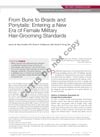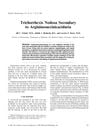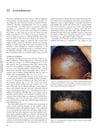 3 citations,
July 2021 in “Cutis”
3 citations,
July 2021 in “Cutis” New military hair rules for women promote inclusivity and prevent hair damage.
 2 citations,
January 2020 in “International Journal of Medical Sciences”
2 citations,
January 2020 in “International Journal of Medical Sciences” Avoid alcohol, ponytails, and oily scalp, and get good sleep to prevent severe hair loss.
 4 citations,
January 2019 in “Annals of dermatology/Annals of Dermatology”
4 citations,
January 2019 in “Annals of dermatology/Annals of Dermatology” Changing hairstyles can help hair regrow in children with hair loss from tight braids or ponytails.
 60 citations,
April 2018 in “Clinical, cosmetic and investigational dermatology”
60 citations,
April 2018 in “Clinical, cosmetic and investigational dermatology” Tight hairstyles and chemical relaxers can cause hair loss known as traction alopecia.
 3 citations,
April 1978 in “PubMed”
3 citations,
April 1978 in “PubMed” The study concludes that traction alopecia, caused by hair styling, can help understand telogen effluvium, a condition of excessive hair loss.
 2 citations,
January 2020 in “Skin appendage disorders”
2 citations,
January 2020 in “Skin appendage disorders” Long hair can cause hair loss due to constant pulling.
 April 2021 in “Annales de Dermatologie et de Vénéréologie - FMC”
April 2021 in “Annales de Dermatologie et de Vénéréologie - FMC” Biphasic alopecia often leads to permanent hair loss and its progression varies widely among individuals.
7 citations,
January 2016 in “Dermatology online journal” Persistent pulling on hair can cause permanent hair loss.
 59 citations,
August 2010 in “Journal of The American Academy of Dermatology”
59 citations,
August 2010 in “Journal of The American Academy of Dermatology” Certain hairstyles and less hair oil use in African American girls can lead to scalp conditions like traction alopecia and seborrheic dermatitis.
 33 citations,
January 2007 in “Pediatric dermatology”
33 citations,
January 2007 in “Pediatric dermatology” Hair thinning and loss in a girl with a rare metabolic disorder was linked to her condition.
 32 citations,
November 2011 in “International Journal of Dermatology”
32 citations,
November 2011 in “International Journal of Dermatology” Diagnose and manage CCCA with thorough history, exams, and labs; treat with anti-inflammatory agents, stress reduction, and stopping harmful hair practices.
 12 citations,
January 2007 in “Current problems in dermatology”
12 citations,
January 2007 in “Current problems in dermatology” Environmental and cosmetic factors, including heat, chemicals, and sun exposure, can cause hair loss and damage.
 6 citations,
November 2018 in “Dermatologic Therapy”
6 citations,
November 2018 in “Dermatologic Therapy” Wearing a ponytail often is linked to hair loss at the front of the scalp in Chinese women.
 5 citations,
December 2015 in “Dermatologic Therapy”
5 citations,
December 2015 in “Dermatologic Therapy” Using a certain drug on the skin can help prevent hair loss caused by pulling on the hair.
 September 2023 in “Ain Shams medical journal”
September 2023 in “Ain Shams medical journal” 31% of female high school students in Minia have hair loss from tight hairstyles, which can become permanent if not treated early.
 January 2020 in “Clinical dermatology open access journal”
January 2020 in “Clinical dermatology open access journal” Changing certain hairstyles can prevent worsening hair loss in Mexican women.

Hair loss causes emotional distress, leading to high spending on treatments, with Minoxidil and Propecia being common but having side effects.
 April 2012 in “Informa Healthcare eBooks”
April 2012 in “Informa Healthcare eBooks” Trichotillomania is a disorder where people compulsively pull out their hair, treated with drugs and behavior therapy.
 105 citations,
April 2004 in “Dermatologic Therapy”
105 citations,
April 2004 in “Dermatologic Therapy” The document concludes that proper diagnosis and a combination of medical, hair-care, and surgical treatments are important for managing alopecia in black women.
 94 citations,
September 2008 in “Journal of the American Academy of Dermatology”
94 citations,
September 2008 in “Journal of the American Academy of Dermatology” Traction alopecia is more common in African women than girls, especially when traction is applied to chemically relaxed hair; avoiding such hairstyles may reduce the risk.
 90 citations,
June 2006 in “The American Journal of Dermatopathology”
90 citations,
June 2006 in “The American Journal of Dermatopathology” The document concludes that accurate diagnosis of different types of hair loss requires careful examination of hair and scalp tissue, considering both clinical and microscopic features.
 86 citations,
August 2014 in “Journal of The American Academy of Dermatology”
86 citations,
August 2014 in “Journal of The American Academy of Dermatology” To diagnose hair loss, use a systematic approach including history, exams, and tests.
 75 citations,
March 2009 in “Journal of The American Academy of Dermatology”
75 citations,
March 2009 in “Journal of The American Academy of Dermatology” CCCA is a hair loss type affecting African women, possibly caused by grooming and chemicals, with various treatments and needing more research.
 73 citations,
June 2003 in “Journal of the American Academy of Dermatology”
73 citations,
June 2003 in “Journal of the American Academy of Dermatology” Dermatologists need to understand African American hair-care practices to better treat their hair and scalp disorders.
 72 citations,
July 2008 in “Dermatologic Therapy”
72 citations,
July 2008 in “Dermatologic Therapy” CCCA is a scarring hair loss condition mainly in African descent women, possibly caused by genetics and hairstyling, treated with gentle hair care and medications.
 57 citations,
September 2005 in “International Journal of Dermatology”
57 citations,
September 2005 in “International Journal of Dermatology” Frequent use of chemical hair relaxants is linked to increased scarring hair loss in Nigerian women.
 55 citations,
October 2003 in “Dermatologic Clinics”
55 citations,
October 2003 in “Dermatologic Clinics” Different hair care practices and conditions affect African American hair and scalp health, requiring specialized knowledge for treatment.
 53 citations,
March 2014 in “Cold Spring Harbor Perspectives in Medicine”
53 citations,
March 2014 in “Cold Spring Harbor Perspectives in Medicine” The document explains different types of hair loss, their causes, and treatments, and suggests future research areas.
 51 citations,
January 2014 in “Pediatric Clinics of North America”
51 citations,
January 2014 in “Pediatric Clinics of North America” The guide explains how to identify and treat children's hair loss, including fungal infections, autoimmune disorders, hairstyle changes, self-correcting conditions, and behavioral therapy for hair-pulling.
 49 citations,
January 2003 in “American Journal of Clinical Dermatology”
49 citations,
January 2003 in “American Journal of Clinical Dermatology” Effective management of children's hair loss involves accurate diagnosis, various treatments, and supportive care.





























